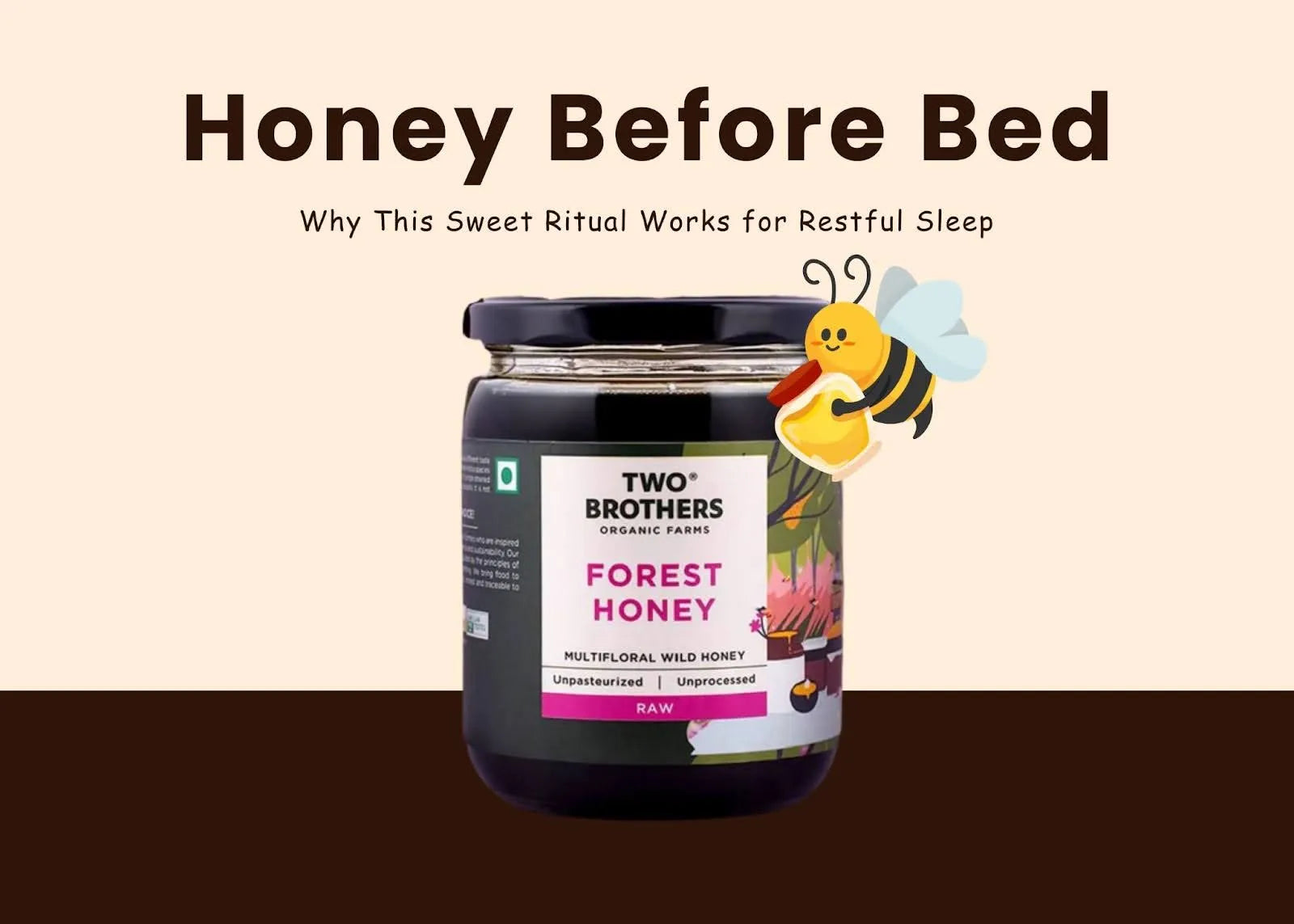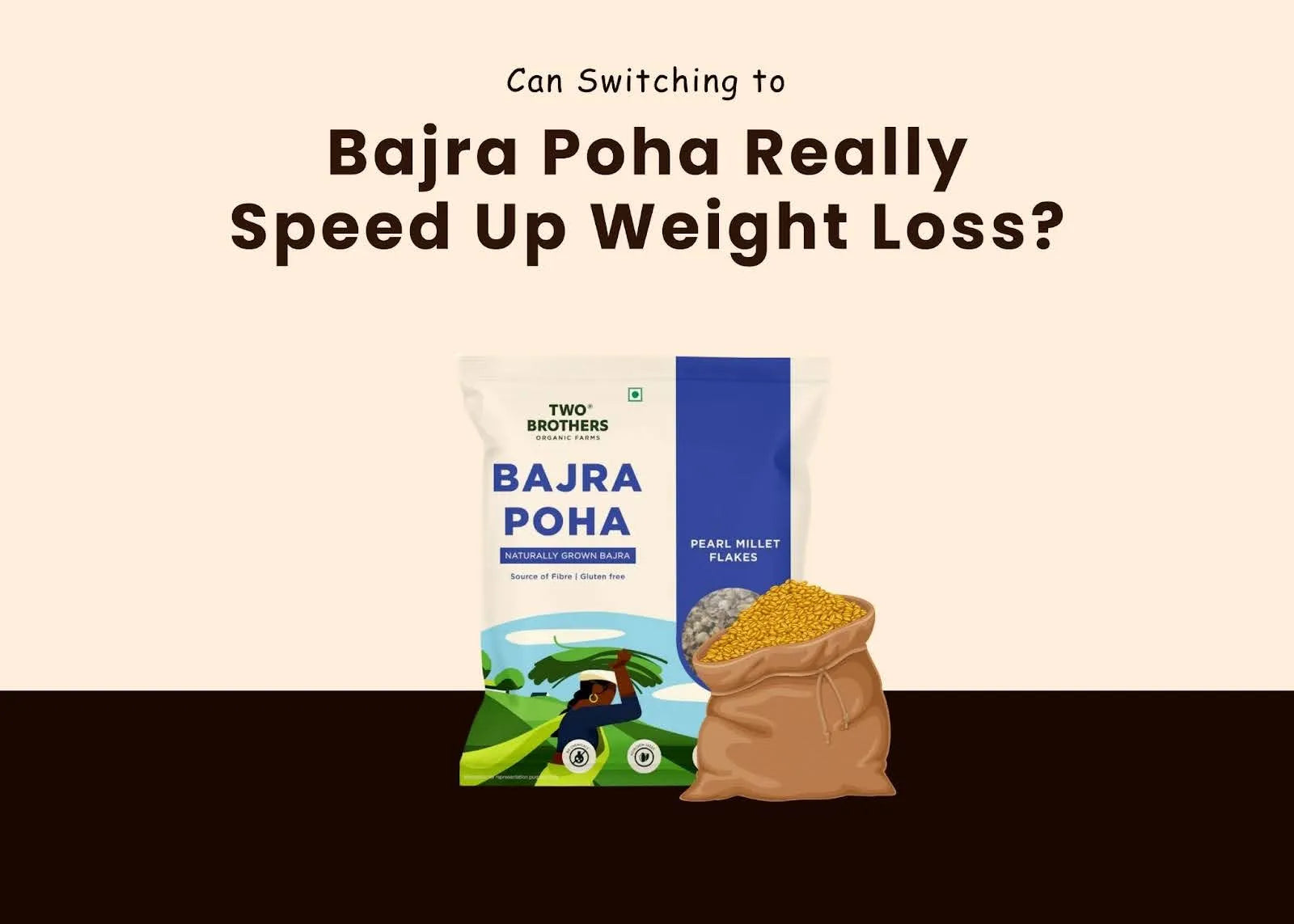What's Really in Your Kitchen Sweetener?
You reach for the sugar bowl out of habit. But should you? For years, families across India and beyond have relied on white sugar to sweeten their tea, desserts, and daily meals. Yet as wellness conversations evolve in 2026, more people are questioning this choice. The truth is, not all sweeteners affect your body the same way. Some nourish while others merely provide empty calories.
Three natural sweeteners consistently appear in health-conscious kitchens: raw honey, organic jaggery, and traditional sugar. Each brings something different to the table, quite literally. Understanding the distinctions between honey vs sugar, the jaggery vs sugar debate, and where organic honey fits into modern nutrition can transform how you fuel your body. What makes one sweetener superior to another? How do raw honey benefits compare to the mineral richness of jaggery? And what do honey nutrition facts reveal about this ancient superfood?
Let's settle the sweetener debate once and for all with facts, not food myths.
How Do These Sweeteners Compare Nutritionally?
Breaking Down the Nutrition
When comparing sweeteners, calories matter, but so do nutrients. Here's what you need to know:
Raw honey stands out nutritionally. A single tablespoon contains around 64 calories along with trace amounts of vitamins, minerals, enzymes, and antioxidants. The honey nutrition facts reveal compounds like flavonoids and phenolic acids that support immunity and reduce inflammation. Raw, unprocessed honey retains bee pollen and propolis, both valued for their health properties.
Jaggery, made from concentrated sugarcane juice or palm sap, offers approximately 383 calories per 100 grams. Unlike refined sugar, jaggery retains iron, magnesium, potassium, and B vitamins. This mineral content makes it particularly valuable for those addressing iron deficiency or seeking digestive support after meals.
White sugar provides about 387 calories per 100 grams but virtually zero nutrients. Refining strips away any naturally occurring vitamins or minerals, leaving only sucrose. This makes sugar an "empty calorie" food that spikes blood glucose without nourishing the body.
Glycemic Index Comparison
|
Sweetener |
Glycemic Index (Approximate) |
Impact on Blood Sugar |
|
Raw Honey |
58 |
Moderate rise |
|
Jaggery |
84 |
Moderately high rise |
|
White Sugar |
65 |
High rise |
The glycemic index measures how quickly a food raises blood glucose. While all three sweeteners impact blood sugar, raw honey includes a slower, more gradual rise compared to sugar. Jaggery, despite its nutrient density, ranks highest on the glycemic index, meaning it requires mindful portioning.
What Are the Real Benefits of Raw Honey?
Why Choose Raw Honey Over Processed Varieties?
Not all honey delivers equal health value. Commercial processing often involves heating and filtering, which destroys beneficial enzymes, bee pollen, and antioxidants. Organic honey that remains raw and unfiltered preserves these vital compounds.
Raw honey benefits extend across multiple health dimensions:
- Antioxidant Powerhouse: Contains flavonoids and polyphenols that combat oxidative stress and reduce inflammation throughout the body.
- Natural Energy Source: Provides quick-burning fructose and slower-digesting glucose for sustained energy without the crash associated with refined sugar.
- Digestive Support: Acts as a prebiotic, feeding beneficial gut bacteria and promoting digestive health.
- Immune Booster: The antimicrobial properties of raw honey, particularly varieties like Manuka, support immune function and wound healing.
- Throat Soother: Coating properties make honey effective for calming coughs and soothing irritated throats.
- How to Use Raw Honey Daily
Adding raw honey to your routine doesn't require elaborate recipes. Here are simple, effective ways:
- Stir a teaspoon into warm (not boiling) water each morning for a gentle detox drink
- Drizzle over yogurt with nuts and fresh fruit for a nutrient-dense breakfast
- Use as a natural sweetener in smoothies instead of processed sugar
- Spread on whole grain toast with nut butter for balanced energy
- Mix into herbal teas once they've cooled slightly to preserve enzymes
Two Brothers Organic Farms offers several varieties of raw, unfiltered honey that preserve nature's goodness. Their Forest Honey and Acacia Honey options come from sustainable sources, ensuring both purity and environmental responsibility. When you choose quality organic honey, you're investing in a product that truly nourishes.
Why Does Jaggery Matter in the Health Conversation?
What Makes Jaggery Different from Sugar?
The jaggery vs sugar comparison reveals stark nutritional differences. While both originate from sugarcane, processing makes all the difference. Jaggery undergoes minimal refinement, retaining molasses and minerals that white sugar loses entirely.
Traditional jaggery preparation involves boiling sugarcane juice until it solidifies, preserving iron, magnesium, potassium, and phosphorus. This mineral profile explains why jaggery has been used in Ayurvedic medicine for centuries, particularly for blood purification and digestive health.
Health Benefits of Choosing Jaggery
- Iron-Rich: Especially beneficial for women, children, and anyone addressing anemia or low hemoglobin
- Digestive Aid: A small piece after meals stimulates digestive enzymes and reduces acidity
- Respiratory Support: Combined with warm water, jaggery soothes respiratory passages
- Natural Detoxifier: Supports liver function and helps flush toxins from the body
- Energy Provider: Slower glucose release compared to refined sugar supports steady energy
Two Brothers Organic Farms produces chemical-free jaggery using traditional wood-fired methods that preserve authentic flavor and nutritional value. Their Sugarcane Jaggery comes in both block and granulated forms, making it versatile for cooking, baking, or simply enjoying after meals.
When Should You Choose Each Sweetener?
Honey vs Sugar: Which Wins?
For daily use, the honey vs sugar comparison clearly favors raw honey. While both provide sweetness, honey delivers:
- Active enzymes that support digestion
- Antioxidants that protect cells from damage
- Antimicrobial properties that support immunity
- A lower glycemic response that prevents energy crashes
- Trace minerals absent in refined sugar
Sugar provides none of these benefits. Its sole contribution is quick energy through sucrose, often followed by an energy dip that leaves you reaching for more.
Jaggery vs Sugar: What's the Better Choice?
In the jaggery vs sugar debate, jaggery edges ahead nutritionally due to mineral content and slower digestion. However, portion control remains important since jaggery still impacts blood glucose significantly.
Choose jaggery when:
- Making traditional Indian sweets and desserts
- Seeking minerals like iron and magnesium
- Supporting digestion after heavy meals
- Looking for alternatives in baking where molasses flavor works well
Choose raw honey when:
- Adding to beverages that aren't boiling hot
- Seeking antimicrobial and immune support
- Wanting sustained energy without crashes
- Using as a spread or topping where flavor shines
Choose neither (or minimal amounts) when:
- Managing diabetes or prediabetes
- Working on significant weight loss
- Dealing with candida or yeast sensitivities
Can You Use These Sweeteners for Weight Management?
Do Natural Sweeteners Help with Weight Loss?
No sweetener magically promotes weight loss. However, choosing nutrient-dense options like raw honey or jaggery over empty-calorie sugar provides more value per calorie consumed.
The fiber and mineral content in jaggery may slightly improve satiety compared to sugar. The enzymes and antioxidants in raw honey support metabolic health. Still, all sweeteners contain calories that add up quickly. Moderation remains key regardless of which sweetener you choose.
For sustainable weight management:
- Limit total sweetener intake to 1-2 teaspoons daily
- Pair sweeteners with protein, healthy fats, or fiber to slow absorption
- Focus primarily on whole foods rather than added sweeteners of any kind
- Use sweeteners as occasional flavor enhancers, not staple foods
What Should You Look for When Buying?
How to Identify Quality Honey
Not all honey labeled "pure" or "natural" lives up to those claims. Look for:
- Raw and Unfiltered: Ensures enzymes and pollen remain intact
- Single-Origin: Mono-floral varieties like acacia or wildflower maintain distinct flavor profiles and properties
- Minimal Processing: Avoid ultra-filtered or heat-treated honey
- Organic Certification: Confirms bees foraged in pesticide-free areas
- Visible Crystallization: Natural honey crystallizes over time; this indicates authenticity
Two Brothers Organic Farms provides complete transparency about sourcing and processing. Their honey varieties maintain raw integrity while meeting safety standards, giving you confidence in what you're consuming.
How to Choose Authentic Jaggery
Commercial jaggery sometimes contains chemical additives or colorants. Genuine jaggery should:
- Have an earthy, molasses-like aroma
- Display natural color variation from golden to dark brown
- Dissolve slowly in water without leaving residue
- Come from chemical-free sugarcane processed traditionally
Two Brothers Organic Farms offers jaggery made using heritage methods that honor traditional preparation while ensuring purity. Their commitment to organic farming means the sugarcane itself grows without synthetic pesticides or fertilizers.
FAQ's on Honey vs Sugar vs Jaggery
Q1. Is raw honey safe for diabetics?
While raw honey has a lower glycemic index than sugar, it still raises blood glucose. Diabetics should consult healthcare providers before adding honey to their diet and monitor blood sugar responses carefully if approved.
Q2. Can children under one year consume honey?
No. Raw honey may contain botulism spores that infant digestive systems cannot handle safely. Wait until after the first birthday before introducing any honey.
Q3. Does heating honey destroy its benefits?
High heat degrades enzymes and reduces antioxidant levels in honey. Add honey to warm, not boiling, beverages to preserve beneficial compounds.
Q4. Can jaggery replace sugar completely in recipes?
Jaggery works well in many recipes but has a distinct molasses flavor that doesn't suit all dishes. It also contains moisture that can affect baking chemistry, so adjustments may be needed.
Q5. Which sweetener provides the most minerals?
Jaggery contains the highest concentration of minerals like iron, magnesium, and potassium. Raw honey contains trace minerals along with unique compounds like enzymes and antioxidants that jaggery lacks.
Making the Sweetener Switch in 2026
Your choice of sweetener matters more than you might think. While all three options discussed here provide calories and sweetness, raw honey and jaggery deliver additional nutrients that refined sugar simply cannot match.
The honey vs sugar comparison consistently favors raw honey for daily use, thanks to enzymes, antioxidants, and antimicrobial properties. The jaggery vs sugar debate similarly tips toward jaggery due to mineral content and traditional health applications. Yet neither honey nor jaggery should be consumed without awareness of their caloric impact and effect on blood glucose.
Quality matters immensely. Choosing organic honey from trusted sources like Two Brothers Organic Farms ensures you receive genuine benefits raw honey rather than processed imitations. Their commitment to traditional methods, organic farming, and complete transparency sets them apart in a market full of inferior products.







